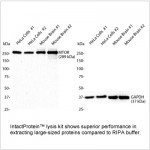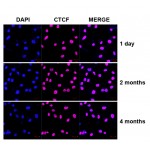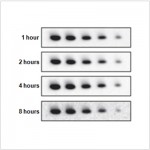| Reactivity: | M |
| Applications: | WB |
| Host Species: | Rabbit |
| Clonality: | Polyclonal |
| Full Name: | FMO3 rabbit polyclonal |
Gene Name: | Dimethylaniline monooxygenase [N-oxide-forming] 3 |
Synonyms: | Dimethylaniline oxidase 3, FMO form 2, FMO3, FMOII, TMAU, Hepatic flavin containing monooxygenase 3, Trimethylamine monooxygenase, Flavin containing monooxygenase 3 |
Immunogen: | KLH conjugated Synthetic peptide corresponding to Mouse FMO3 |
Isotype: | IgG |
Purity: | Affinity purification |
Predicted MW. | 61 kDa |
Observed MW. | 61 kDa |
Uniprot ID: |
Product Usage Information
Applications | Species | Dilution | Positive tissue |
WB | Mouse | 1: 300-1: 500 | liver, kidney |
Background
Microsomal flavin-containing monooxygenase (FMO) catalyzes the FAD-, NADPH-, and O2-dependent oxidation of a large number of xenobiotics containing soft nucleophiles,including alkaloids, pesticides, and pharmaceutical substances.Based on the cDNA sequence, the FMOs are classified into five subfamilies (FMO1 to FMO5).In human beings ,FMO3 is predominant in the adult liver,but not appear sex-dependent in the tissue.In the mouse liver,its expression has been shown to be sex-dependent and expressed only in females.Defects in FMO3 are the cause of trimethylaminuria (TMAU).This antibody is specific to FMO3.
Images
 | Western blot analysis of FMO3 (GB113169) at dilution of 1: 500 |
Storage
| Storage | Store at -20°C for one year. Avoid repeated freeze/thaw cycles. |
| Storage Buffer | PBS with 0.02%sodium azide,100 μg/ml BSA and 50% glycerol. |



